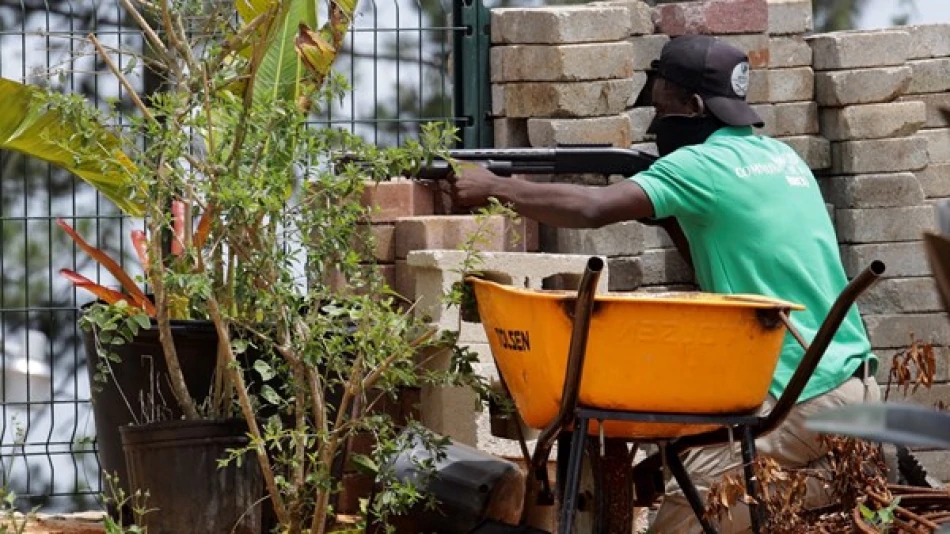
United Nations Warns of Disastrous Conditions in Haiti, Urges Immediate Action
UN Chief Slams International Community's "Shameful Neglect" as Haiti Descends Into Gang-Controlled Chaos
UN Secretary-General António Guterres delivered a scathing rebuke to the international community Thursday, declaring that Haiti faces a "catastrophic mix of suffering" while remaining "shamefully neglected" by world powers. His stark warning comes as gang violence has effectively paralyzed the Caribbean nation, with over 3,100 people killed in just the first half of 2024 and the capital Port-au-Prince under near-complete criminal control.
State Authority Collapses as Violence Spreads Beyond Capital
Addressing the UN Security Council, Guterres painted a grim picture of a nation where basic governance has ceased to function. "State authority is collapsing as gang violence sweeps through Port-au-Prince and spreads to other areas, paralyzing daily life and forcing families to flee," he stated.
The violence has moved beyond traditional criminal activity into systematic attacks on civilian infrastructure. Hospitals and schools face repeated assaults, while civilians remain "under siege" according to horrifying reports reaching UN officials. The rule of law, Guterres emphasized, "has collapsed entirely."
Multinational Force Falls Short of Promises
The Secretary-General's criticism carries particular weight given the international community's tepid response to Haiti's crisis. A Kenya-led multinational security mission, deployed over a year ago with promises of 2,500 police officers, has managed to send only around 1,000 personnel from six countries—with Kenya providing more than 700 of those forces.
This deployment shortfall has proven catastrophic. Seven nations, including the United States, requested just one day before Guterres' speech that the Security Council strengthen the multinational force, effectively admitting the current approach has failed.
Political Vacuum Deepens Crisis
Haiti's security collapse cannot be separated from its political disintegration. The nation has lacked stable leadership since President Jovenel Moïse's assassination in 2021, creating a power vacuum that gangs have systematically exploited.
A transitional presidential council assumed control in 2024 following Prime Minister Ariel Henry's resignation, promising elections before their mandate expires in February 2026. However, with gangs controlling most of the capital and state institutions crumbling, the feasibility of credible elections appears increasingly doubtful.
International Response: Too Little, Too Late?
Guterres' accusation of "shameful neglect" reflects growing frustration with the international community's inadequate response to what many experts consider a humanitarian catastrophe in America's backyard. Unlike international interventions in other regions, Haiti's crisis has struggled to attract sustained global attention or resources.
The funding shortage Guterres highlighted represents more than bureaucratic inefficiency—it signals a fundamental lack of political will among major powers to address Haiti's collapse comprehensively. This stands in stark contrast to rapid international responses to crises in Europe or other strategically significant regions.
Regional Implications and Migration Pressures
Haiti's deterioration carries implications far beyond its borders. The ongoing violence and state failure are likely to accelerate migration pressures on neighboring Caribbean nations and the United States, potentially creating a regional refugee crisis.
The failure of the Kenya-led mission also raises questions about the viability of African-led peacekeeping operations in the Western Hemisphere, potentially complicating future international intervention strategies in the region.
A Test Case for International Responsibility
Haiti increasingly represents a test case for the international community's commitment to preventing state collapse and protecting civilian populations. The gap between promised support and actual deployment—less than half the pledged police force—demonstrates the challenges of mobilizing effective international responses to complex crises.
With over 3,100 deaths in six months and gangs controlling critical infrastructure, Haiti's trajectory appears to be toward complete state failure unless the international community dramatically escalates its engagement. Guterres' harsh words suggest that without immediate, substantial intervention, Haiti risks becoming a permanently failed state—a outcome that would represent a profound failure of international diplomacy and humanitarian responsibility.
Most Viewed News

 Layla Al Mansoori
Layla Al Mansoori






